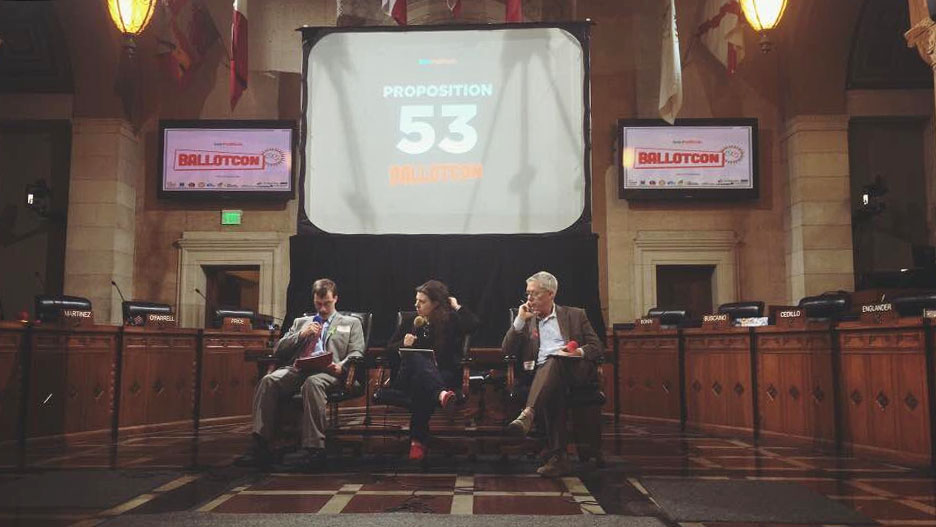Convention aims to explain ballot measures to public

Photo courtesy of Jessica Levinson
Pro and con · Panelists debated the benefits and drawbacks of Proposition 53, which would require voter approval for the state to issue over $2 billion in public infrastructure bonds that would lead to an increase in taxes.
Spectators gathered at Los Angeles City Hall on Saturday for BallotCon, an event designed to inform voters about statewide ballot measures.
The Jesse M. Unruh Institute of Politics was one of the supporters of the event, which included speakers who discussed the pros and cons of each of the 17 measures that will be on the ballot on Nov. 8.
The convention was sponsored by The California Endowment, California Community Foundation and SeePolitical, a nonprofit organization that creates animated videos to simplify proposed legislation and the electoral process for voters.
Both sponsors and opponents spoke on each ballot proposition, providing voters with information on why one side should be supported over the other.
The panelists discussed topics including a proposed tobacco tax, criminal sentences, school bonds, state fees on hospitals, revenue bonds, firearms and ammunition, legislation and proceedings, drug pricing, condoms in adult films and tax extensions. The attendance nearly doubled for a discussion on marijuana legalization later in the convention.
Toward the latter half of the event, speakers discussed Proposition 60, which would require adult film performers to use condoms during sex.
“This proposition is about public health and [bringing] fairness to the industry that has blatantly disregarded the law,” a supporter argued. “And if you look at any industry, when it comes to workplace safety, whether construction or medical, these people follow laws.”
Adult entertainer Siouxsie Q. opposed the proposition, saying that while there should be regulation, Proposition 60 would allow any California resident to file a lawsuit against a performer, producer or film crew member who participated in the production of a pornographic film that violated Proposition 60.
This, she argued, would not keep the “already marginalized workforce” safe.
The death penalty was also a significant topic at BallotCon. One of the ballots discussed, Proposition 62, would remove the death penalty, while another, Proposition 66, would keep it but with certain modifications to make the appeals process faster and more efficient. Opponents of Proposition 62, who support keeping the death penalty in place, sent a written statement to the convention that explained why criminals such as child murderers, serial rapists and torturers deserve to be sentenced to death.
“Proposition 62 sets the worst of the worst burglars to get to stay alive at the taxpayers’ expense … even after committing their horrible crimes, in light of the pain of their victims’ families,” the statement said.
Proponents of abolishing the death penalty argued, in turn, that capital punishment is racially skewed, unreliable and expensive.
“My perspective is fairly simple to understand: that we know there are innocent people on death row for crimes they didn’t commit,” said Alex Simpson, the associate director of the California Innocence Project and a supporter of Proposition 62.
Other topics discussed were Proposition 67, which would repeal a statewide ban on plastic bags, and Proposition 65, which would make proceeds from a 10-cent paper bag fee go to environmental causes.
A representative from the American Progressive Bag Alliance said that his organization supported voting “no” on Proposition 67 and “yes” on Proposition 65 due to plastic bags’ danger to the environment and profit to big corporations.
Dan Jacobson, part of the Environment California organization, agreed.
“[If all the bags used by California in a year are] stretched out end-to-end, it could circle the globe 200 times,” Jacobson said.
Speakers also debated Proposition 59, which would allow the state to limit campaign contributions and political spending of corporations and big businesses. This proposition would allow state officials to use their authority to overturn the 2010 Supreme Court ruling in Citizens United v. Federal Election Commission. This decision allowed corporations to donate to political candidates on the grounds that they are “people” who have a right to freedom of speech. At Saturday’s event, a proponent of reversing this decision argued that money should not become a voice for corporations.
“[Proposition 59 would] restore our right to regulate money in elections and make it clear that corporations do not have the constitutional rights [that] human beings [do],” the supporter said.
The opposition, however, argued that California legislature already opposes the Citizens United ruling, so voting “yes” on the proposition would be “a waste of voters’ time.”
“The main reason we do not like this proposition is that it’s asking voters to tell legislators to do something that the legislators will figure out eventually,” the opponent said. “Basically, it’s saying, ‘We want you to curtail the first amendment and we’ll leave it up to you as to how you do it,’ [and] that is terrible policy-making.”
